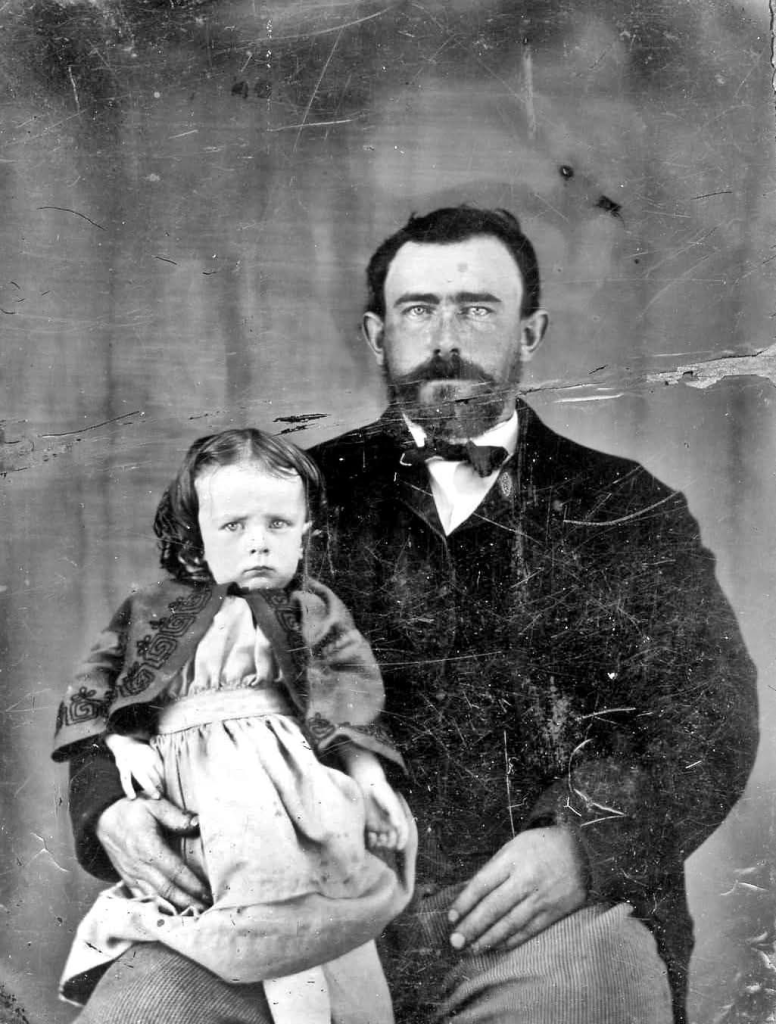Eli Turner buried his wife beneath a cottonwood tree the same night their daughter came into the world
The wind carried a bitter edge that night, as though the land itself were grieving. The lantern’s flame shivered in Eli Turner’s trembling hand, casting flickering shadows across the small room. The midwife had departed hours ago, leaving only the low moans of labor, the hush of night, and an urgency Eli could no longer ignore.
When the baby’s cry finally cut through the darkness, it was beautiful—but it came with the unbearable cost. In the next room lay his wife, motionless. In those same moments, as life arrived in one corner of the house, death claimed another.
Eli wrapped her body in his coat, sealing her within the fabric he’d last touched. Dust motes danced in the lantern glow. He whispered a promise through tears, through the ache in his chest:
“You’ll never go hungry, not while I’m breathing.”
He stepped outside into the wind-whipped plain. The land was silent but for his feet crunching on dry grass. The baby in his arms whimpered. He carried both life and loss across that ground until he reached a lone cottonwood tree, its pale blossoms trembling in the moonlight. There, in shallow earth, he laid her beneath its roots and covered her with soil, pressing each handful down as though sealing a secret to the world.

Then he stood over the grave until the dawn began to pale. The newborn was safe in his arms. The wind whispered. The night had passed, but Eli’s journey was just beginning.
Life on the prairie: The burdens and the vow
It was 1876, and the plains around Abilene were as beautiful as they were merciless. Drought, hail, and blistering heat could strike at any moment. Each season demanded its price.
Eli turned the stony land with nothing but grit, a plow, and a promise. He woke before first light, arms calloused, back bent under the weight of toil. He planted, he dug, he prayed. He learned how close starvation stood at the door. When storms ripped through, he would huddle inside, baby in one arm, rifle across his knees, daring thunder and wind to venture closer.
Milk ran dry in summers when the cows faltered. In those months, he’d measure every drop for the child. He would find scraps of grain, barter with itinerant traders, even trade his last cartridge for flour. Coyotes howled near the fences. At night he lay awake, listening for the snap of twig or distant footsteps, guarding the fragile life beside him.
Little June: Growing amid promise and silence
By the time the little girl, June, could walk, the homestead had changed. The fields were modest but growing. The house, patched and expanded, stood firm against wind and time. June would wander the fence rail, watching her father shape their world from rough ground and raw hope.
Eli never spoke of the night he buried his wife — he only spoke to June in soft patience, teaching her survival: how to coax life from dusty soil, how to read the sky, how to carry grief quietly. The townsfolk whispered of him, calling him “Iron Eli.” They said no man could bear such loss and still press forward. But Eli refused the label. He viewed himself simply as a man honoring a vow.
Each spring, when the cottonwoods bloomed white against the sky, he would walk to that lone tree. There, he tipped his battered hat. He said nothing aloud—no eulogy, no flourish. Just a pause. A quiet salute. He thought of her in silence, and of June, the living echo of their love.
Echoes over time: The weight and the legacy
As June grew older, she asked about her mother — what she looked like, how she laughed, what dreams she held. Eli answered in fragments: “She loved the dawn,” “She spoke in soft laughter,” “She never feared hardship.” But he could not name her dreams. The burden of memory sat heavy in his chest. He feared forgetting, and yet the past was a wounded thing.
Over decades, the land yielded more than bare survival. June learned to read, to tend gardens, to hope. In town, people recognized their perseverance. And yet, no one truly knew the deep grief behind those steady eyes.
When Eli grew old, his body weakened, the cough came slow. June became his steady support. On the final spring, as the cottonwoods flared white, Eli walked to the grave one last time. His hands trembled. He slipped that battered hat back in place. He thought of his wife, of the vow he made that night. He thought of June, grown and beloved.
Then, his knees buckled. He knelt. He closed his eyes. A breeze loosened the cottonwood petals, and they drifted, pale as snow, over the grass and the earth.
Pause.
He whispered, “I kept my promise.”
When June looked down at him, she saw the end was near. But his face held peace. He had carried sorrow and love both, and he had endured.